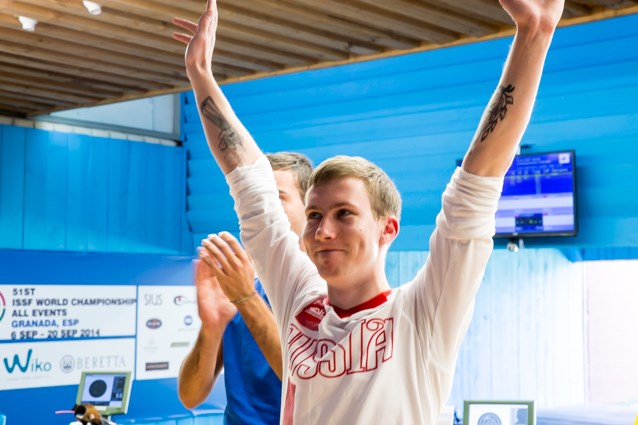Andrey Pochepko, 19, of the Russian Federation just took over the first-ever ISSF final-format junior event, Junior Men's 50m Pistol, at the ISSF World Championship in Granada, Spain.
Pochepko took an early lead, scoring a 29.1 in the first three-shot competition round. Silver medallist Dario Di Martino of Italy then overcame him with a 30.3 in the next round, but Pochepko immediately gained the first position back, taking advantage of Di Martino's poor 6.9. Pochepko then firmly stayed at the top, keeping Di Martino and bronze medallist Bowen Zhang of China at an increasingly safe distance. Pochepko came into the final duel against Di Martino leading by 3.1 points and closed with a strong 3.5-point lead. His final score was 193.6.
“The hardest part was the qualification,” Pochepko said referring to its first series, where he had only scored 82.
“I did not expect to win. It feels very good.”
Pochepko took part in the European Championships in Moscow earlier this season, taking twelfth place at Men's 10m Air Pistol.
Di Martino (190.1) was also in Moscow, where he came fifth. Last year, he took two gold medals at the European Championships, in Osijek and Odense.
Zhang got the bronze (169.7) at this first international appearance. His teammate Wu Jiayu was fourth (146.2). Alexander Bassariev, Pochepko's teammate, came fifth (127.8)
Poland's Rafal Blaszkiewicz was once in a tie for second place with Di Martino, but eventually an 8.1 and an 8.8 made him slip down to sixth place (109.8).
Armenia's Zaven Igityan, fifth at the latest Youth Olympics, took seventh place (89.0). Tuguldur Oyun of Mongolia was last (69.6).
TEAM
The People's Republic of China won the competition, with a total score of 1631. Wu's 552 points were critical for his country's success. Then came Russia (1628) and the Republic of Korea (1607).

